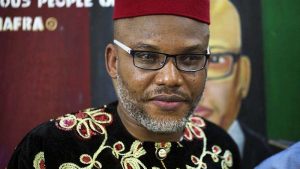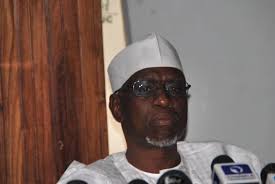
By Tunde Johnson, Abuja
The Federal High Court in Abuja has ordered Eyninnaya Abaribe, a Senator and two others standing as sureties for Nnamdi Kanu, leader of the proscribed Indigenous People of Biafra (IPOB), to explain the IPOB leader’s whereabouts.
Justice Binta Nyako in her ruling on Tuesday gave the senator three options.
One of the options was for Abaribe to produce the defendant in court and then apply to be discharged as a surety.
The other option the judge gave was for him to be ready to forfeit his N100million bail bond.
The third option was for Abaribe to request to be given time to produce the defendant in court.
Ogechi Ogunna, a lawyer who appeared for Abaribe, informed the judge that his client had filed a motion seeking to be discharged as Kanu’s surety.
The two other sureties, Immanuel Shalum Okabenmabu and Tochukwu Uchendu, were absent from court and not represented by any lawyer.
On the options given by the judge, Ogunna replied saying, “he (Abaribe) is not in a position to do any of these.”
However, the judge insisted Abaribe must opt for one of the three options.
With the judge’s insistence, Ogunna opted to be given time to produce him.
The two other sureties were not represented I court on Tuesday.
It will be recalled that Kanu was granted bail by the judge on April 24, 2017, but was absent from court on Tuesday when his trial was billed to commence.
But his three co-defendants were produced in court by prison officials.
Ifeanyi Ejiofor, Kanu’s lawyer, told Justice Nyako that Kanu had been missing after soldiers allegedly invaded his home on September 14, 2017, adding that the Nigerian Army was in the best position to produce the defendant.
But Justice Nyako said Abaribe’s motion could not be heard until Kanu was produced in court.
Earlier, Shuaibu Labaran,prosecuting counsel, urged the judge to revoke defendant’s bail, order for his arrest, and direct the defendants’ three sureties “to show cause why the bail bond of N100million entered into by each shall not be forfeited or they be committed to prison.”
The trial was been adjourned until November 20.

















